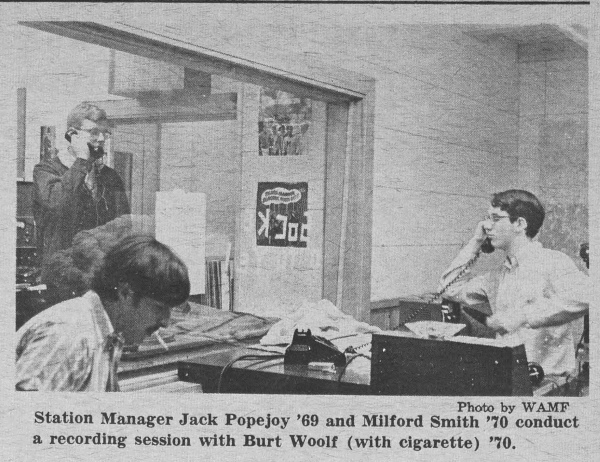Letters page: 'Happy that my station had given me the facts - the corpse's name
by Jim Steinman '69
Amherst Student
Early Saturday morning, or late Friday night, a young man jumped off the 19th floor of J.F.K. Towers over at U.Mass. I thing WAMF must have been very happy about it. They stayed on the air all night broadcasting bulletins, interspersed with the usual run of cheap rock and roll. Nobody thought it important enough apparently to take the time to program more appropriate music, sounds with a little honesty within them.
The point I'm trying to make is how disturbing it is that, rather than try to form new creative forms of communication while it is still possible in a non-professional setting, the WAMF group seems content to merely imitate the emptiness already present in vacuum-cleaned commercial radio. And on Saturday morning, this emptiness prevailed. After every report on this boy's suicide, WAMF was always eager to remind the listener: (paraphrased)
"We are the only station broadcasting at this moment in this area. We are the only station that cared so much about getting the facts on this story to you as they arise, that we have stayed on all might with news reports. The minute the incident occurred, WAMF sent out its news gathering team straight to the scene to find actual witness reports. In this way, we've been able to almost recreate the scene for you as it happened, to let you in on the drama as it unfolded at UMass tonight. This is just one more example to prove what I think has been true all along: WAMF has the top, the quickest, and the most efficient news team in the area. We may be a college station, but we serve everyone."
Except, of course, that kid who jumped. The announcer seemed overjoyed with their reports, bursting with pride and eagerness, unable to refrain from playing the next on-the-scene installment, immediately following the next soul sound. At the end of the night, the announcer called it a "very exciting evening" right before the alma mater came on. I think it was around 6:15 in the morning, and I went to sleep, happy that my station had given me all the facts and I now knew the corpses' name, and what it was like when he fell, and that his death was instantaneous and that he was mangled a lot, and that the Association were at the top of the Valley Talley survey, and that down at radio central, they hadn't slept for 18 hours, but it was worth it . . . After all, it was good practice. It's getting cold now and Amherst students are getting ready to caress their own images to help keep them warm while ghosts of flesh and feeling pass on by to be dry cleaned and permanently put away . . .
The kids down at WAMF are amazing, adept, incredibly efficient and professional. They're just too busy to think as high as 19 floors.
When they went off the air, it was morning, and the sun was coming up. All I could think to myself was: If it gets any lighter we won't see a thing. And then I went to sleep. Maybe next time, two people will jump and the radio will take dedications from all those Who knew them.
Jim Steinman '69
Source: Amherst Student Archives
